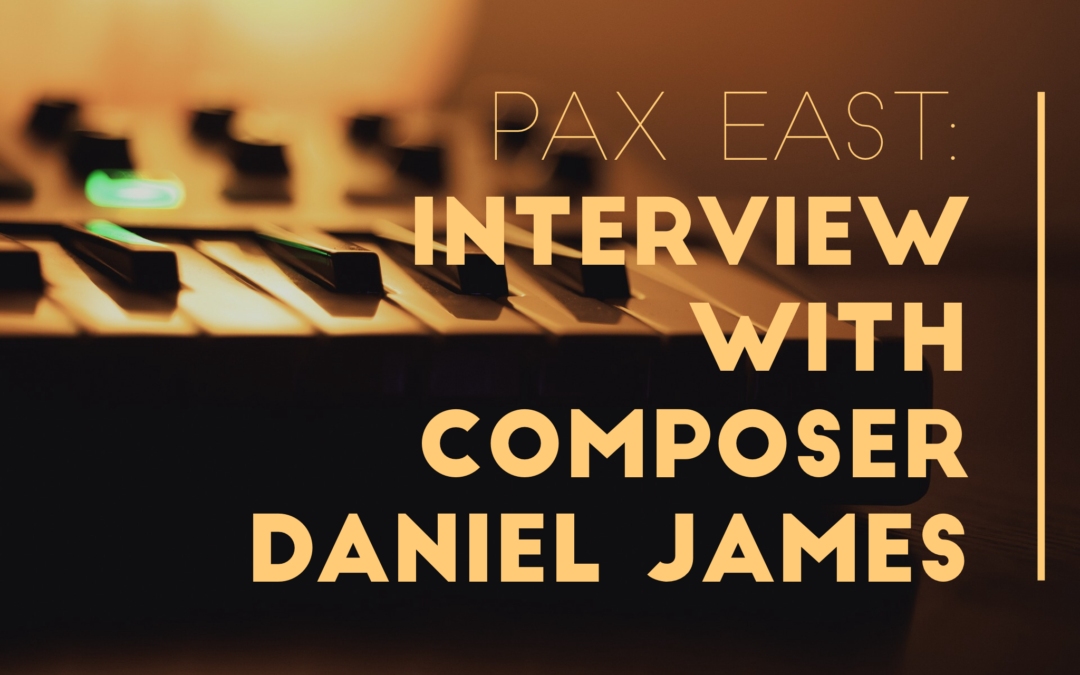At PAX East 2016, I had the pleasure of attending a game audio panel titled “Maestros of Video Game Music,” hosted by Emily Reese. It was a 60-minute panel that seemed to fly by, but I was able to meet the composers afterwards and a few of them graciously agreed to an on-the-spot interview. One of which was the very kind and talented Daniel James.
Daniel has composed for some pretty big name games (and movies) in the past 6 years, including Metal Gear Soild V: The Phantom Pain, Call of Duty: Black Ops 3, Killer Instinct, and more. He’s also hilarious. On the Maestros of Video Game Music panel, he and Tom Salta (Halo: Spartan Assault/Strike) had a pretty entertaining banter going between the two of them and had a particularly good exchange about networking which Daniel references during our interview. If you listen closely, you can also hear the Videri String Quartet doing a set in the background (we were right outside of the MAGFest Jam Space).
Among other things, in this interview we discuss:
- One of Daniel’s favorite music theory tricks that he recently added to his arsenal;
- The biggest career mistake new composers make, and why he hates the word “networking;”
- How he’d start over if all he had was $500 and a laptop;
- His hilarious parting advice.
Listen to the interview right here, and read my favorite takeaways below. Enjoy!
Turn Your Weakness into Your Strength
Daniel claims to have a terrible memory. When he’d listen to one of his older work, he’d have a hard time remembering what he did and how he did it. To combat this, he began documenting his process on YouTube to remember the process he used and to pass that knowledge on to anyone interested in learning his techniques. This had a fantastic bonus effect: his videos demonstrated his competence in a helpful, non-aggressive way. On the extreme end of the spectrum, these same videos created a huge opportunity when composer Hans Zimmer found and connected with him through one of Daniel’s YouTube videos. Whoa!
When it Comes to Sound Design, Keep Your Orchestration in Mind
Daniel drew a very important parallel between orchestration and sound design. He recommends remembering the basics of balancing sound across the frequency range, keeping your lower-frequency sounds fewer and farther between to avoid clash and using higher-pitched sounds for the fast stuff. Life is balance, folks.
“It’s more [about] the people you’re friends with. Not the people you have connections with – it’s who you’re friends with.”
Daniel describes his feelings about the word “networking,” and that the most important connections you’ll make are the friendships you have. These genuine connections are the open doors you’re looking for, and will take you much further than mere professional contacts.
Thanks, Daniel!
That’s it for today, but I’d like to extend a huge THANK YOU to Daniel James for taking the time to interview with me during a very busy day at PAX East. Looking forward to our next encounter, Daniel!
Did you find this interview valuable? If so, please take a moment to SHARE this interview using the social media buttons at the top and bottom of the post!









This was a great interview! Lots of good tips in here. I especially like the part about YouTube and networking being making friends… meanwhile, Sephiroth plays in the background.
Random note though, Omnisphere 2 is 499 US Dollars. He’d be done.
500$ is a tight limit. As David said, Omni itself is 500. Even if you choose random other orchestral library, it would be 250-350, give or take, that would left you with, say 200. Decent headphones, 100, decent mic 100 and that’s it. If you somewhere, you can pay few bucks for that internet connection we all need. But in fact, that’s really what one needs these days, right?
Support that. The quite minimum is 1000-1500 U.S. bucks. Only Kontakt 5 sampler costs 399$. Else you need a DAW (from 200$ and above), low cost range synths (>100$), drums and percussion (>100$), orchestral library (>349$) and some soft (SFX, mixing and mastering) (>399$). Oh, yeah, else we count a monitor headphones (not a “pro”) (>150$). As a result we have more than 1700$! The good way if you will take a bundle of soundlibraries and instruments from one company with a great discount (e.g. Komplete 10 from NI – 999$ with quite needed set of instruments, SFX and soft-tools) instead many libraries from different companies. Сonclusion: D.James is a tough guy but he was cunning about the last question. IMHO)
I told him he could have his DAW at the beginning of the question, so Abbleton was a freebie. While it would be very cool to have a 100% viable answer on this, I did put him on the spot 😉 I think the big take-away here is Daniel’s must-have arsenal is still pretty lean compared to the perceived cost of a professional setup that many novice composers think they need to own before they’ll be able to produce respectable work.
I’m impressed you should think of something like that
I love reading these articles because they’re short but informative.
Thanks! Glad you’ve found them useful!
Yes! Having One Winged Angel playing in the background made it much harder for me to stay focused.
Thanks a lot to this interview.
What a great interview! Daniel is such a nice and funny guy. Couldn’t quite focus when Sephirot’s theme came on the background though haha. Anyway, great interview, helpful tips!